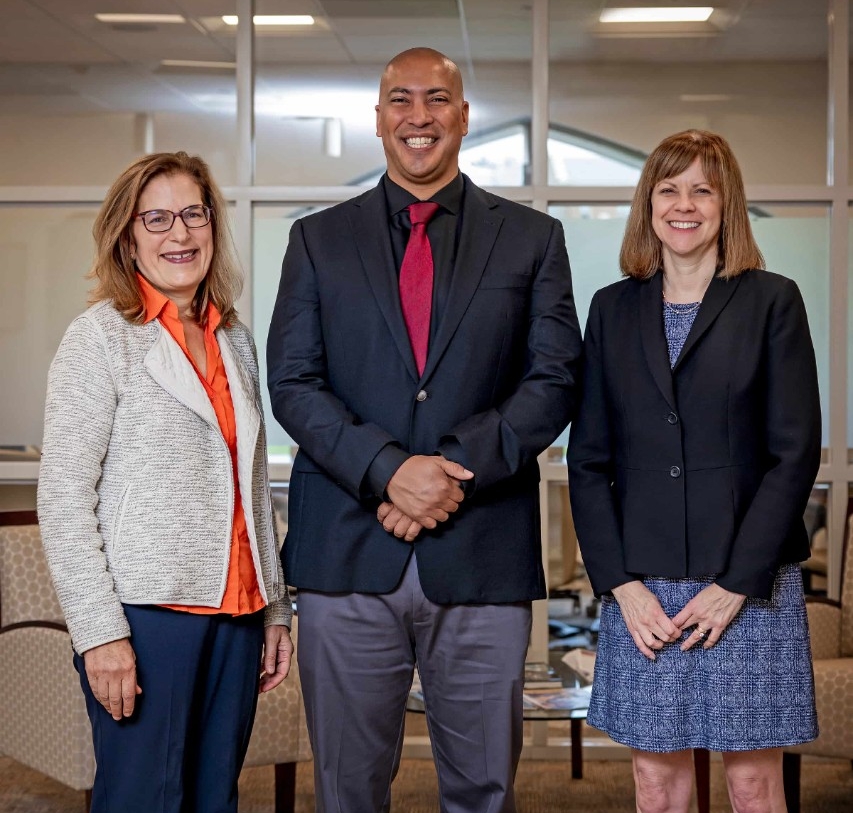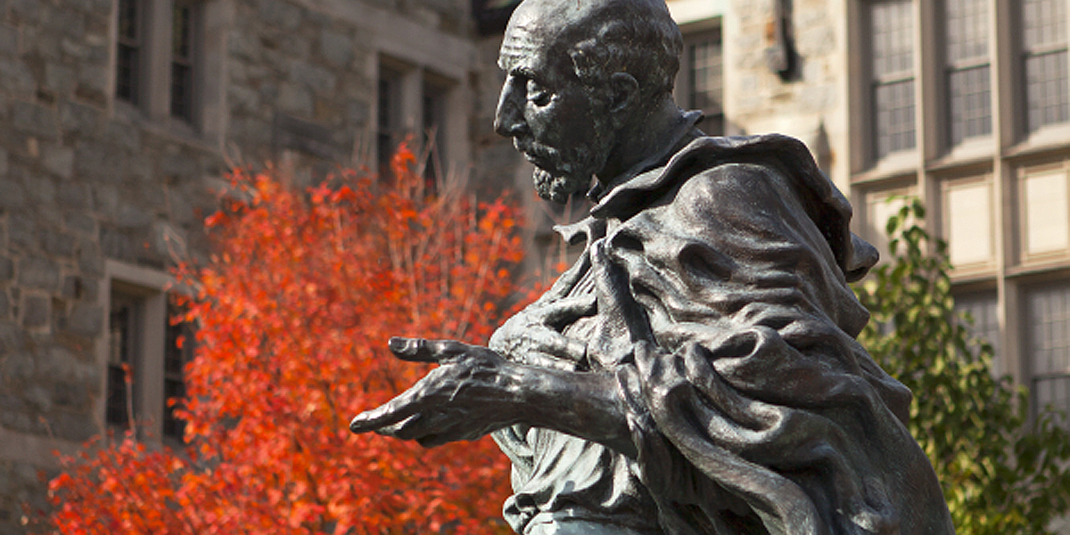The statue of St. Ignatius Loyola on the BC campus (Caitlin Cunningham)
A new Boston College professional development program aims to cultivate leadership skills informed by Ignatian values and practices among employees in both the University’s academic and non-academic sectors.
Launched in January, the Ignatian Leadership Development Program is a 12-month, cohort-based, four-module program that comprises elements such as individual and group retreats, reflection, leadership coaching, and self-assessment. The first cohort of 16 will complete the program in December, and a second group will begin in January.
According to program organizers, ILDP participants emerge with a deeper understanding of BC’s Jesuit, Catholic heritage and leadership rooted in the Ignatian leadership tradition, a better perception of themselves as leaders, and the motivation to align leadership practice with “the greater good.” They also develop the ability to adapt leadership best practices in a Jesuit, Catholic context, integrate reflection and discernment practices in their work, and assess the effectiveness of leadership behaviors and results.
The ILDP is an outgrowth of the University’s Strategic Plan, which calls for an enhanced commitment to formation of faculty and staff. Whereas the Ignatian Colleagues Program—a national initiative of the Association of Jesuit Colleges and Universities—offers a similar orientation for BC’s senior administrative and academic leaders, the ILDP focuses on the next tier of leadership, including associate vice presidents and provosts, executive directors, associate deans, directors, and department chairs. And while BC’s Management Development Perspectives program provides exposure to the distinctive qualities of a Jesuit, Catholic university and preliminary opportunities for reflection, the ILDP offers far more depth.
According to Vice President for Human Resources David Trainor, “ILDP is an extension of BC’s formative education experience to faculty and staff leaders. It is our hope that it will deepen the understanding of our heritage and tradition while enhancing the leadership capacity of our colleagues who participate in the program.”
Through ILDP, organizers say, Boston College will develop a “next generation” of leaders, all with demonstrated potential to make a greater impact on the University, that is fully conversant in the Ignatian vision and well positioned to share it among colleagues in their respective departments and offices. BC contracted external consultants to help devise the program curriculum, and an internal cross-functional design group—including representatives from Human Resources and other administrative and academic units, as well as members of the BC Jesuit Community.
Members of each ILDP cohort are nominated by senior administrators in their respective divisions; candidates must have a minimum of two years of service to the University. There is a substantial time commitment: once-a-month full-day sessions from January to June as well as September, October, and December, and a two- and four-day retreat.
“ ILDP is an extension of BC’s formative education experience to faculty and staff leaders. It is our hope that it will deepen the understanding of our heritage and tradition while enhancing the leadership capacity of our colleagues who participate in the program. ”
Participants are each assigned to a leadership coach external to the University who helps them focus on their unique strengths and areas of challenge as part of their learning and development in ILDP; the coaching process helps participants seek, receive, and interpret 360-degree feedback (through which employees receive confidential, anonymous evaluations from the people who work with them).

BC Dining Services Director Elizabeth Emery, Morrissey College Associate Dean Rafael Luna, and AVP for Student Health and Wellness Melinda Stoops are part of the first Ignatian Leadership Development Program cohort. (Caitlin Cunningham)
Associate Vice President for Student Health and Wellness Melinda Stoops felt ILDP would give her a better sense of her professional strengths and help expand her leadership skills in the context of her work in higher education and student affairs in particular. Having considered the Ignatian and spiritual dimensions of her work at a “fairly superficial” level up until then, she looked forward to exploring these in greater depth.
“I really love the cohort model and found my relationships with my ILDP colleagues to be a great resource for exploring the program material. In addition, I’ve established relationships with a group of people from across campus which has provided me with a greater understanding of different departments, as well as an expanded professional support network.”
Morrissey College of Arts and Sciences Associate Dean Rafael Luna found some of the case studies used in ILDP were familiar from his days as an M.B.A. student, but in this setting “had you view them through an Ignatian lens.” The program provided him with “a toolkit” useful for discussions with his colleagues on how to fulfill their academic and formative mission, he said.
“The intentionality of reflection was incredibly helpful. Just slowing things down to listen to the still, small voice helped me to check in with myself, but I also was able to learn about turning reflection into action, which is at the heart of Ignatian leadership,” said Luna, who added that the insights he derived even helped him in talking with his daughter about the progress of her college career.
BC Dining Services Director Elizabeth Emery also felt empowered through the use of reflection in her daily routine. “I would think about what went well, whether it was the interactions I had with my team or an experience at home, and I would celebrate those three or four positives instead of dwelling so much on what had been difficult that day—it just really reframes everything. That’s what I try to convey in working with my senior team: You still have to manage the negative, but when you focus on the positivity, you might find it leads you to a solution. It improves your confidence and your approach.”
“Essentially, we are doing for our employees what we do for our students,” said Office of Employee Development Director Bernard O’Kane. “Ignatian principles are at the core of all undergraduates’ Boston College experience, and the University believes they should animate the work we do here every day, whether it’s in a classroom, an office, or a dining hall.”
O’Kane, along with program facilitators Stefane Cahill Farella and Aislynn Rodeghiero from the Office of Employee Development, say the ILDP reflects a belief that learning the concepts of leadership is not enough: Successful leaders must be versed in and demonstrate a style that enhances their organization’s culture. At BC, they note, that culture is grounded in the Ignatian vision.
“Ignatian values, like integrity, respect, and honesty, are universal values, and you don’t have to be Catholic to embrace them,” said Farella. “But at BC, we believe it is important for everyone—student or employee—to have an understanding of the faith and tradition on which this University is built, and what animates us as an institution.”
Added Rodeghiero, “The Ignatian Leadership Development Program is about creating a community of practice across BC, to normalize the experience of using Ignatian principles and praxes in our work. It’s a means to encourage communication among ourselves, so that we can share our experiences—positive or negative—in a common framework.”
More detailed information about the Ignatian Leadership Development program will be forthcoming on the Human Resources/Employee Development website.
Sean Smith | University Communications | September 2022




